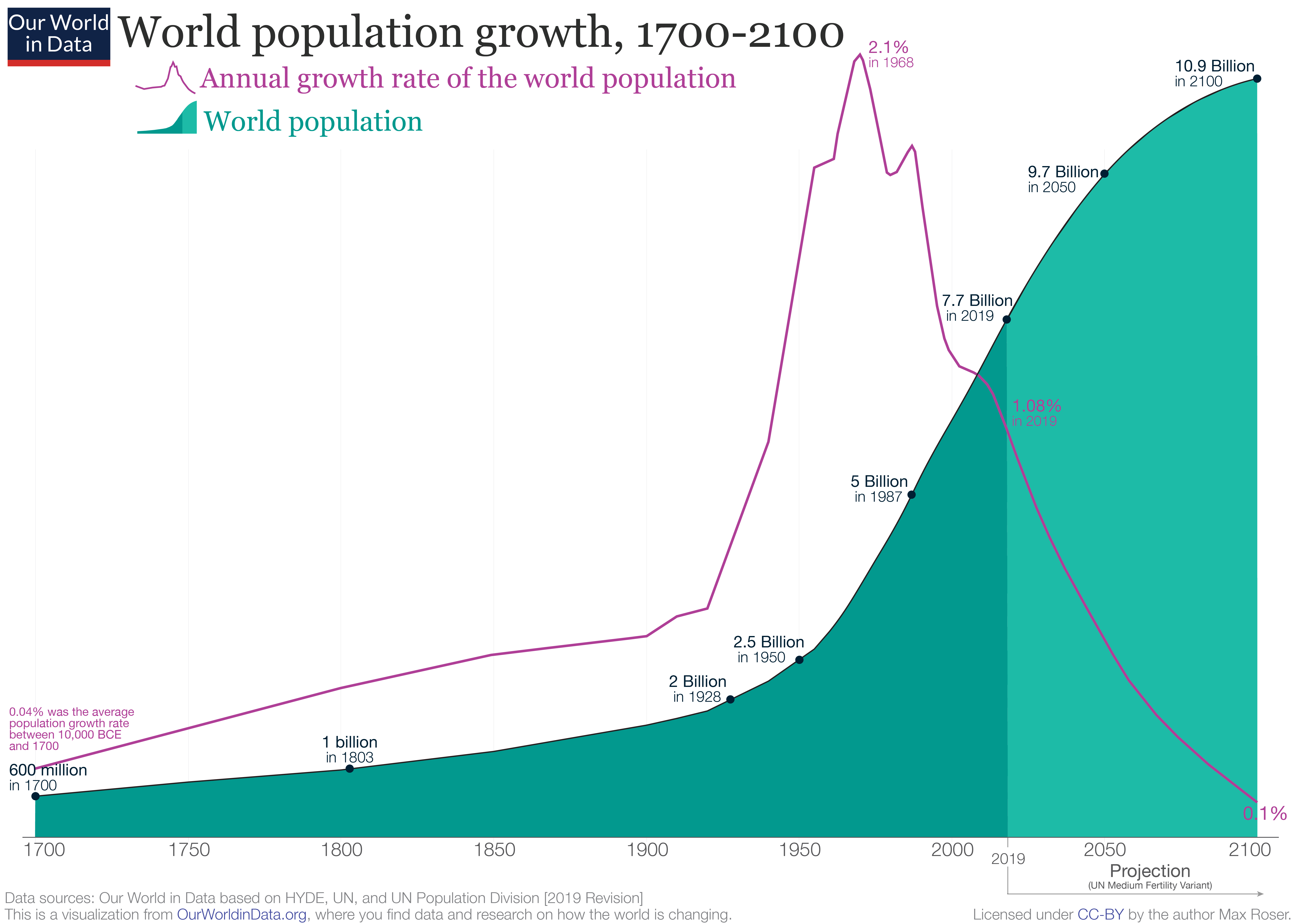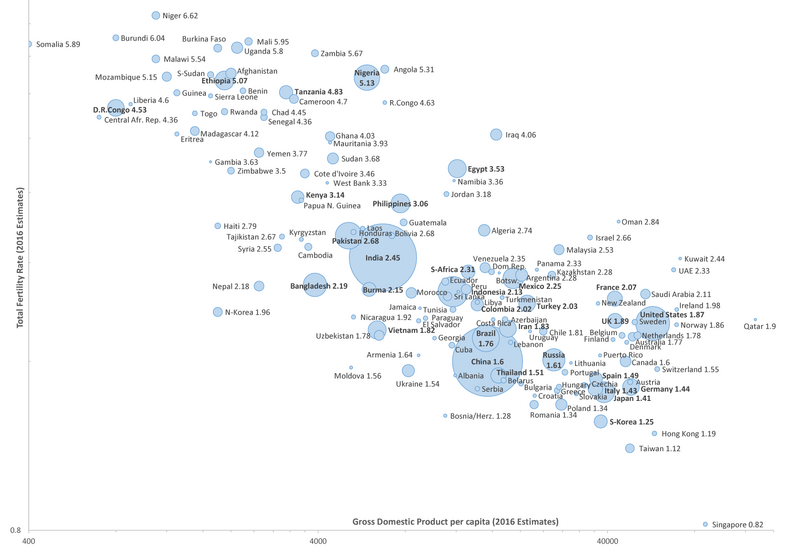Changing Trends
In 1798, Thomas Malthus published An Essay on the Principle of Population. In it, he correctly described the existing data that showed the population was increasing faster (geometrically) than the food supply (linearly) creating a potential future of doom and catastrophe. Malthus’ ideas have been recycled over and over, but we’re two hundred plus years on from the original idea and we’re still waiting for the doom and catastrophe part.
In the meantime, “Malthusian” has become an adjective to describe any impending situation caused by population growth. Malthus read the data - correctly - and saw in the data an exponential curve along with a future disastrous limit. As a devout Anglican, he thought it was imposed by God to teach upright principles. Here in the 21st century, our theology has advanced - I remain hopeful that this is true - as has our understanding of economics, human nature, and technology. Malthus was wrong in any number of ways - about how food production could increase, about how technology would change, even about how abundance will apply across populations or how incentives will affect growth. Even today, something like Jevons Paradox is relatively unknown and very unintuitive.
The real use of the word Malthusian ought to be for the extrapolation of data forward without change. He saw something that looked exponential and applied the future as fact. But exponentials have funny properties, and things we often think of as exponential are actually sigmoids. They rise rapidly for awhile, then start to asymptote out to some linear or fixed growth rate.
World population is one of those. If you look back at history, it looks even worse than when Malthus saw it. We went from 2 billion people to nearly 8 billion in the last hundred years.

But that’s been changing now for a few decades and it may be the most important trend that hardly anybody thinks about. We can measure this trend by fertility rate - how many children per woman are being born. Just over 2 children per woman is the replacement rate for a steady-state population. Above 2 and the population is growing. Below 2 and it’s shrinking.
The entire developed world is well below 2. The only continent that is consistently above 2 is Africa. If you plot fertility rate against wealth, you get a consistent relationship - as areas of the world get richer and more developed, the number of children decreases. This tracks over time too. Countries that advance rapidly like China or India decrease their growth rate at the same time.

I’ve never thought before what it means to have a sub-replacement fertility rate. Japan and South Korea are aging incredibly rapidly and dealing with the changes now. It’s certainly true that some positives will come out of it - overcrowded metro areas will be less crowded for instance. But a much larger concern is economic. Ever since World War 2, every advanced economy has been focused on growth and driven by an increasing population and steadily increasing GDP. And then they can pay for retirees through taxes and growth from the next, larger generation down the line. But what happens when that ends? When there are fewer 20 year olds than 60 year olds? The retirement age will have to be pushed way back and taxes will increase. Young people won’t like paying for all the grandmas out there and grandma won’t like working when she’s 80. And that’s just the start.

Theme For English B
Langston Hughes is my favorite American 20th century poet - his poems are like jazz on the page. One of my favorites is something he wrote for a college class when he was 20. You should read it (it’s not long), but here’s the ending.
Well, I like to eat, sleep, drink, and be in love.
I like to work, read, learn, and understand life.
I like a pipe for a Christmas present,
or records—Bessie, bop, or Bach.
I guess being colored doesn’t make me not like
the same things other folks like who are other races.
So will my page be colored that I write?
Being me, it will not be white.
But it will be
a part of you, instructor.
You are white—
yet a part of me, as I am a part of you.
That’s American.
Sometimes perhaps you don’t want to be a part of me.
Nor do I often want to be a part of you.
But we are, that’s true!
As I learn from you,
I guess you learn from me—
although you’re older—and white—
and somewhat more free.
It’s hard to be more honest than that. It’s a form of truth, and this kind of personalized perspective is what I think people mean when they tell you to “speak your truth”. But it’s not The Truth in an objective or verifiable or scientific way. It’s storytelling. Delightful and insightful storytelling with different aspects of truth woven like thread, but storytelling nonetheless.
We tell ourselves stories all the time. About ourselves or our friends or our future or our country. The stories we tell about our country have divided us in a whole new way within the last ten years. George Packer details four different Americas based on the myths that different groups today talk about - Free America, Smart America, Real America, and Just America. He concludes without selecting any particular myth as the best, instead pointing out that “I don’t much want to live in the republic of any of them.”
The myths we tell ourselves are really important. If we focus on negative aspects, we can easily eschew the future by rigidly arguing about the past. This sort of path often becomes a self-fulfilling prophecy of destruction. The positive myths reinforce the ideals we all struggle towards and draw us in competition with ourselves closer to our goals. It is of course possible to romanticize our outlook and ignore the lessons present in any mistakes or wrongs. That’s why Hughes poem is so compelling: he points out our flaws and injustice with no hesitation but doesn’t disparage the ideal we’re struggling towards. We’re together in this. “That’s American”.
The U.S. Difference
I’ve realized through my lesson in fertility that the United States is different than almost every other place on Earth. That difference is a huge advantage. When you think of Japan, you think of the Japanese. When you think of China, you think of Chinese (there are other demographic groups, but Han Chinese are who rule China). Italy has Italians and Swedes are from Sweden.
But from the United States, we’re Americans. And in that we’ve got Italian Americans, Nigerian Americans, Irish Americans, Afghani Americans, Japanese Americans, African Americans, Salvadorian Americans and any other American you can possibly think of. Our national identity is NOT tied to any kind of racial identity. In almost every other country on Earth, nationalistic identity is tied to place. A Japanese citizen in China is a tolerated outcast at best. A Muslim immigrant in Europe isn’t adopted as French or German. The only other place that even comes close to the American ideal is the UK and some of it’s former colonies like Australia. But it’s not the same. Americans are different. We have a long and continued history of racism that’s still here today. It may take us a generation to get there - everything from the horrifying legacy of slavery and Jim Crow to the more mundane (but still racist) “Irish Need Not Apply” signs of the early 20th century to the absurd modern debates about a border wall prove we can be just as idiotic and racist as human nature allows.
The United States demographic trend is following other developed countries and our fertility rate is right around 1.8; well below the replacement rate. Our native population will shrink. But we still have the capacity to grow. Immigration is the secret key to continued growth and abundance in the United States. When people talk about the power of diversity, this is what they should mean. It’s not a quota, it’s a strength of common ideals not tied to a specific racial or place-oriented identity. Americans are tied to America and the story that we’re a grand Melting Pot.
Until now, immigration has seemed to me to be just another hot button political issue that garners headlines. I have a renewed perspective now on just how vital it is to the character and content of our country. The words on the Statue of Liberty have always resonated to me, they’ve always been a call both to charity and to a better ideal of acceptance and openness.
“Keep, ancient lands, your storied pomp!” cries she With silent lips. “Give me your tired, your poor, Your huddled masses yearning to breathe free, The wretched refuse of your teeming shore. Send these, the homeless, tempest-tost to me, I lift my lamp beside the golden door!”
But they mean more now - they’re key to the beautiful story we tell ourselves about how we can get better in the future. They reveal the secret to more human flourishing, not just for those tired and sick, but for everyone. The more people we have working together, the better off we all are. Matt Yglesias talks about One Billion Americans. That sounds great to me.
